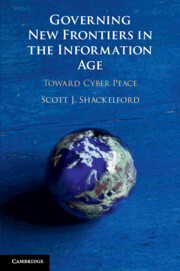Book contents
- Governing New Frontiers in the Information Age
- Governing New Frontiers in the Information Age
- Copyright page
- Dedication
- Epigraph
- Contents
- Figures
- Tables
- Foreword
- Preface
- Acknowledgments
- Abbreviations
- Part I Understanding Cybersecurity and Other Collective Action Challenges in the Information Age
- Part II Security and Environmental Threats Facing the Frontiers: Case Studies in Commons Management and their Application to Cybersecurity and Internet Governance
- 3 On Climate Change and Cyber Attacks: Leveraging Polycentric Governance to Help Heal the Planet and Promote Cyber Peace
- 4 Was Selden Right?
- 5 Governing the Final Frontier: A Polycentric Approach for Managing Space Weaponization and Debris
- Part III Governing New Frontiers in the Information Age
- Conclusion
- Book part
- Index
5 - Governing the Final Frontier: A Polycentric Approach for Managing Space Weaponization and Debris
from Part II - Security and Environmental Threats Facing the Frontiers: Case Studies in Commons Management and their Application to Cybersecurity and Internet Governance
Published online by Cambridge University Press: 13 March 2020
- Governing New Frontiers in the Information Age
- Governing New Frontiers in the Information Age
- Copyright page
- Dedication
- Epigraph
- Contents
- Figures
- Tables
- Foreword
- Preface
- Acknowledgments
- Abbreviations
- Part I Understanding Cybersecurity and Other Collective Action Challenges in the Information Age
- Part II Security and Environmental Threats Facing the Frontiers: Case Studies in Commons Management and their Application to Cybersecurity and Internet Governance
- 3 On Climate Change and Cyber Attacks: Leveraging Polycentric Governance to Help Heal the Planet and Promote Cyber Peace
- 4 Was Selden Right?
- 5 Governing the Final Frontier: A Polycentric Approach for Managing Space Weaponization and Debris
- Part III Governing New Frontiers in the Information Age
- Conclusion
- Book part
- Index
Summary
This chapter examines the evolution of the legal regime governing outer space and how resurgent national interests are challenging the peaceful use of the final frontier, including the expanding capacity to launch cyber attacks on satellite infrastructure and the potential environmental and security effects of such attacks. Using the same approach as Chapters 3 and 4, this chapter begins by briefly investigating the impact of advancing technology (that in some cases has been accelerated by cyberspace), multipolar politics, and resource scarcity on space governance. It then discusses the evolution of space law from the Outer Space Treaty to the present, and analyzes the extent to which the governance structure of space is changing due to increasing national regulation and private activity, as well as to the expansion of Internet access and its associated demands. Next, this chapter investigates whether the emerging space regime complex is mitigating the collective action problems of space weaponization and junk proliferation, and how the international community may perform better by using regime effectiveness findings from the literature on institutional analysis. Finally, governance best practices, such as those stemming from the International Code of Conduct for Outer Space Activities, are applied to cybersecurity and Internet governance.
- Type
- Chapter
- Information
- Governing New Frontiers in the Information AgeToward Cyber Peace, pp. 298 - 372Publisher: Cambridge University PressPrint publication year: 2020

